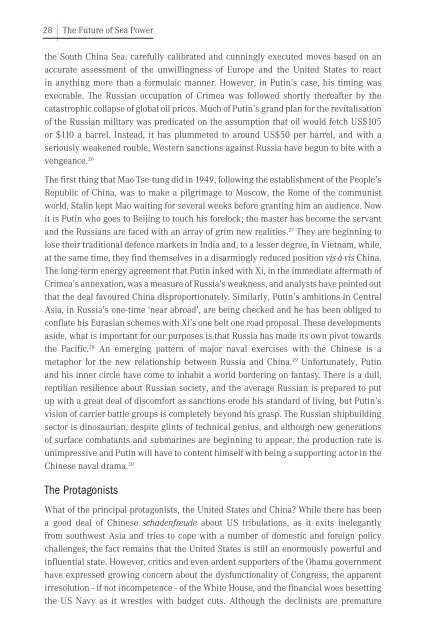THE FUTURE OF SEA POWER
SPC2015_Proceedings
SPC2015_Proceedings
Create successful ePaper yourself
Turn your PDF publications into a flip-book with our unique Google optimized e-Paper software.
28 |<br />
The Future of Sea Power<br />
the South China Sea: carefully calibrated and cunningly executed moves based on an<br />
accurate assessment of the unwillingness of Europe and the United States to react<br />
in anything more than a formulaic manner. However, in Putin’s case, his timing was<br />
execrable. The Russian occupation of Crimea was followed shortly thereafter by the<br />
catastrophic collapse of global oil prices. Much of Putin’s grand plan for the revitalisation<br />
of the Russian military was predicated on the assumption that oil would fetch US$105<br />
or $110 a barrel. Instead, it has plummeted to around US$50 per barrel, and with a<br />
seriously weakened rouble, Western sanctions against Russia have begun to bite with a<br />
vengeance. 26<br />
The first thing that Mao Tse-tung did in 1949, following the establishment of the People’s<br />
Republic of China, was to make a pilgrimage to Moscow, the Rome of the communist<br />
world. Stalin kept Mao waiting for several weeks before granting him an audience. Now<br />
it is Putin who goes to Beijing to touch his forelock; the master has become the servant<br />
and the Russians are faced with an array of grim new realities. 27 They are beginning to<br />
lose their traditional defence markets in India and, to a lesser degree, in Vietnam, while,<br />
at the same time, they find themselves in a disarmingly reduced position vis-à-vis China.<br />
The long-term energy agreement that Putin inked with Xi, in the immediate aftermath of<br />
Crimea’s annexation, was a measure of Russia’s weakness, and analysts have pointed out<br />
that the deal favoured China disproportionately. Similarly, Putin’s ambitions in Central<br />
Asia, in Russia’s one-time ‘near abroad’, are being checked and he has been obliged to<br />
conflate his Eurasian schemes with Xi’s one belt one road proposal. These developments<br />
aside, what is important for our purposes is that Russia has made its own pivot towards<br />
the Pacific. 28 An emerging pattern of major naval exercises with the Chinese is a<br />
metaphor for the new relationship between Russia and China. 29 Unfortunately, Putin<br />
and his inner circle have come to inhabit a world bordering on fantasy. There is a dull,<br />
reptilian resilience about Russian society, and the average Russian is prepared to put<br />
up with a great deal of discomfort as sanctions erode his standard of living, but Putin’s<br />
vision of carrier battle groups is completely beyond his grasp. The Russian shipbuilding<br />
sector is dinosaurian, despite glints of technical genius, and although new generations<br />
of surface combatants and submarines are beginning to appear, the production rate is<br />
unimpressive and Putin will have to content himself with being a supporting actor in the<br />
Chinese naval drama. 30<br />
The Protagonists<br />
What of the principal protagonists, the United States and China? While there has been<br />
a good deal of Chinese schadenfreude about US tribulations, as it exits inelegantly<br />
from southwest Asia and tries to cope with a number of domestic and foreign policy<br />
challenges, the fact remains that the United States is still an enormously powerful and<br />
influential state. However, critics and even ardent supporters of the Obama government<br />
have expressed growing concern about the dysfunctionality of Congress, the apparent<br />
irresolution - if not incompetence - of the White House, and the financial woes besetting<br />
the US Navy as it wrestles with budget cuts. Although the declinists are premature


